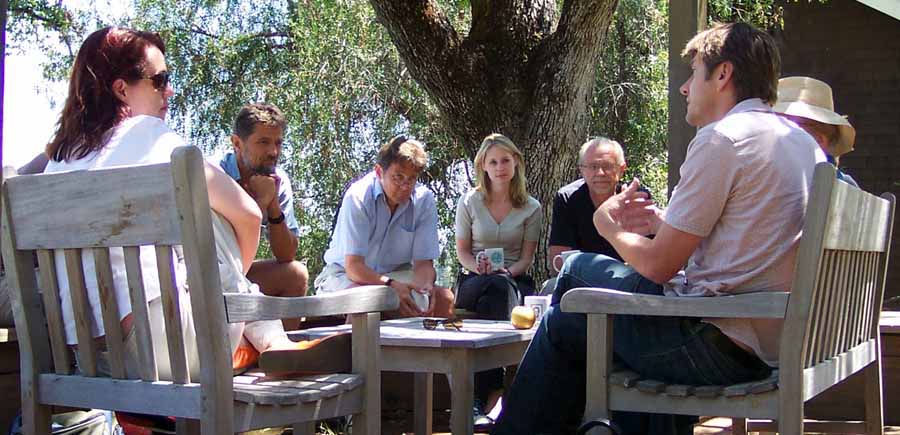Projects
The Center for Advanced Study in the Behavioral Sciences is an especially strong place for collaborative dialogue to flourish, particularly across disciplines. It is neutral ground, not tied to academic departmental life or any one academic discipline, yet it is part of a major university with a high global profile. Our mission is to advance the social and behavioral sciences. Convening a variety of short-term and long-term group projects at CASBS is one way we do this.
PROJECT THEMES
As a general organizing principle, the Center focuses on four overarching themes for purposes of identifying and prioritizing the most suitable projects for funding and support.
Moral Economies of the Future
We explore the reciprocal obligations of citizens, governments, and corporations today and in the past in order to prepare for the future. Our goal is to discover when and why the social compact changes and what the levers are for better policies to meet the objectives of the current moral economy.
Technology and Society
How and when innovations occur reflect a series of societally produced prerequisites: education and skills, economic opportunities and incentives, social networks, legal constraints, and geography. Resulting new technologies raise social, political, and economic questions about the distribution of harms and benefits and how to use technology change to advance human welfare.
Inequality and Inequity
Nearly all CASBS projects are concerned with issues of economic, political, and social inequities. We apply the best contemporary science to understand key questions, but our effort also necessarily includes how best to elaborate policies, practices, and institutions that would create a more inclusive society.
Democracy
A relatively new focus area for CASBS concerns the future of democracy. We focus on the underpinnings of democracy and how to make them more durable and responsive to the immediate needs of the populations they are meant to serve and to the long-term requirements of countries embedded in a globalized world. While we will pay attention to some of the current issues of populism, problematic electoral and legislative decision processes, the manipulation of media, and threats from terrorism, racism, and refugee crises, our primary emphasis is on determining where democracy is broke and how to fix it. At root, this area of focus concerns social cohesion and the future of democracy.
Evidence-based Policy
The academic work on which the evidence-based policy movement is based has seen spectacular improvements over the last several decades. This includes the science of causal inference and the computational, legal, and methodological issues of data sharing and informatics. These developments have been extremely important in bringing science to bear on public policymaking. Nevertheless, there is much room for improvement in both the methods and their application.
For more information, please contact CASBS program director Sarah Wert (wert@stanford.edu).

Research Networks and Projects
CASBS is an accelerator of ideas. It facilitates multi-year, interdisciplinary, intersectoral, and collaborative groups as they progress on significant societal problems. The combination of great researchers and thinkers in multiple meetings over time enhances the prospects for major breakthroughs. Long-term (2–5 years) collaborations of affiliated CASBS and other network scholars concentrating on a specific funded project.
Established Projects & Networks
- Mindset Scholars Network (2014–17)
- Berggruen Center for Philosophy and Culture (2016–20)
- The Future of Work and Workers (2015–16)
- Climate Change and Cities (2017-18) - in partnership with the Stanford Woods Institute for the Environment
Emerging Projects

Workshops
The Center is an especially strong place for collaborative dialogue to flourish, particularly across disciplines. It is neutral ground, not tied to academic departmental life or any one academic discipline, yet it is part of a major university with a high global profile. Our broader mission is to advance the social and behavioral sciences. One way we do this is through workshops - explorations of important topics, over periods of one to five days, in the service of creating research networks and projects.

Summer Institute
In 2016, CASBS held the first of five summer institutes on organizations and their effectiveness. A highly selective class of attendees and instructors came together for an intensive, collaborative, interdisciplinary examination of how we understand what contributes to high performance in a wide range of public and private organizations. The collaborative, interdisciplinary nature of the CASBS summer institute gives early career scholars a chance to integrate, broaden, and deepen their study of organizations outside of the traditional methodological and institutional constraints of departmental life. Dinners and informal discussions with organizational innovators added to the content and learning experience. Robert Gibbons (MIT, professor of economics) and Walter Powell (Stanford, professor of sociology) are the co-directors.
Related Article: 2017 Summer Institute Builds on Storied Legacy

Projects at a Glance
First convened in July 2014, the CASBS workshop on "The Future of Work and Workers" engages participants in a series of meetings to discuss the sources and implications of the ways in which work is changing globally.
Co-sponsored by the Rockefeller Foundation.
Pacific Standard is publishing essays from this project in its series on The Future of Work and Workers.
Collaborations with Stanford Centers
- Clinical Excellence Research Center
- Freeman Spogli Institute for International Studies
- Stanford Cyber Initiative
- Stanford McCoy Family Center for Ethics in Society
- Stanford Neurosciences Institute
- Stanford Woods Institute for the Environment
- Stanford WSD Handa Center for Human Rights and International Justice
Center for Advanced Study in the Behavioral Sciences at Stanford University
75 Alta Road, Stanford CA, 94305 USA | +1 (650) 736-0100 | casbs-info@stanford.edu
© 2015 CASBS | MEMBER SITE




